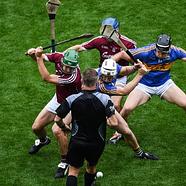At the dawn of a new campaign so many counties believe they have what it takes. But any eventual winner needs to get all of these right
1: Win the tackle count
When the dust had settled after the 2019 final, the press duties were done and it was just ourselves back in the dressing room, togged in and sitting down, we did the debrief same as usual. Win by 10 or lose by 12, we always went through the numbers that the laptops spit out. And one of the biggest cheers that day came when I read out the tackle count and we’d come out the right side.
That’s how important it was to us. Championship matches are hugely intense affairs that require your team to put their bodies on the line. Turnovers and tackles all over the pitch, but especially high up, generally lead to scoring opportunities and often goal chances as teams are not set up right to defend. The lads were as proud of that ‘win’ as anything.
2: Hold your own on puckouts
Judging this one is not as straightforward as reading the data the stats guys deliver on matchday. You might get a number showing we retained 80% of our puckouts, but if most of those are to the full-back line it is not really telling you anything. Useless. Especially if we lose possession from the next pass, because that will more than likely wind up in the concession of a score.
You’re looking for a measure of quality here. At its simplest, you want to secure a route from your puckout that gets you the ball in hand outside your 65, whether that takes one, two, or three passes. The same goes for preventing your opponent doing that from their restarts.
3. Balance the training load
Your team can only function if they are fresh and hungry for battle. Monitoring the load on players has taken on even more importance since the round-robin came in. Recovery in the 24 hours post game is massive as is your overall commitment to stretching and flexibility.
You have to be mindful that some players have played 76 minutes, others a fraction of that, and some of the group have had no action at all. It is nearly like training two different groups, yet you somehow have to keep it inclusive. You can’t have tiers within the panel.
We trained players outside the matchday 26 on the Saturday morning of championship to ensure they didn’t lose ground. If a player on the 26 got minimal or no action, they did their running afterwards at the venue.
The following Tuesday night we might have a ferocious 9 v 9 for anyone who got less than 25 minutes, while the others did tactical or technical work with another coach.
4 Convert your chances
There’s an expectation, where you have a team of really good players, that you convert eight out of 10 chances. We set the bar at 80%. That forces people to understand when they’re in the scoring zone. It’s about decision making and taking the right option for the team all the time.
Obviously, that scoring zone varies for different players. Ronan Maher could be 90 yards out and easily pop a point. You need to know your range and when it’s on. If your body position is right, you’re in your range, you’re on the front foot, we back them to go for it. There’s no fear of mistakes or missing. It’s about having the confidence to take your chances when the stakes are highest.
5 Win your home games
There’s a reason the Cork footballers pushed so hard for Páirc Uí Rinn. Whatever way human nature works, home advantage matters. In life, you’re more comfortable in your own house than anywhere else. And this isn’t like life where you might put out the welcome mat. When people are coming to our house, we need to make sure they know this is going to be uncomfortable for them.
Home form has never been as important in hurling. If you win your two home games, you’d be unlucky to go out.
It’s hard to put a finger on how this one works. We loved running out at Semple Stadium in big championship matches. Our championship record in my six years involved was 100% for the four games we played at home.
It’s something intangible but it’s there. You have to create it, through your team, through the supporters, through your communication with them, through the atmosphere. It’s about protecting your home patch.
6 Draw strength from your panel
The contribution from the Tipp bench in the semi-final and final in 2019 was incredible and those lads ultimately were the difference in capturing Liam MacCarthy. You’re not going to sail through four matches in five weeks with the same 20 players.
I wrote before about how you sometimes have to take A v B matches in context, where there is always more at stake for the possibles than the probables.
But during the campaign, those Tuesday night internal matches are crucial for building competitiveness in your panel. The 9 v 9 or 8 v 8 — where few involved are satisfied with their gametime last week and are bursting to play next Sunday — those games can be among the most ferocious you’ll see. And you need to be watchful when a guy puts his hand up high.
7 Go for goals
We always targetted goals but they’ve come back in fashion generally in recent seasons, which is adding to the spectacle. You can see it in Waterford now. First thought - is the goal on and if not they tip the point. It looks a tall order to win a championship match now without two goals.
You have to decide you're going after them. Encourage that risk versus reward. Seamie in the 2019 final could have easily taken the point, but he took that step, saw Bubbles, flashed it across, goal.
You’re thinking goals and you play off those instincts. And if it doesn’t come off, no problem.







